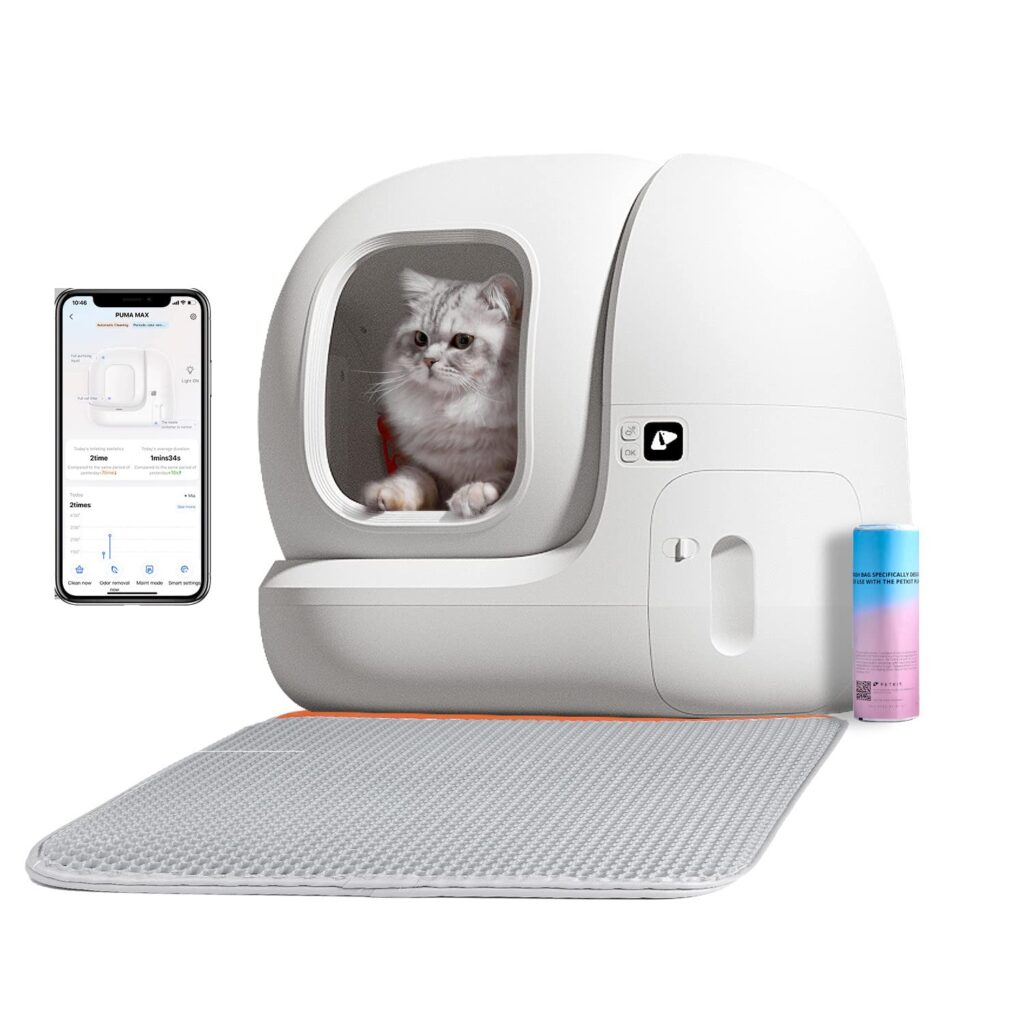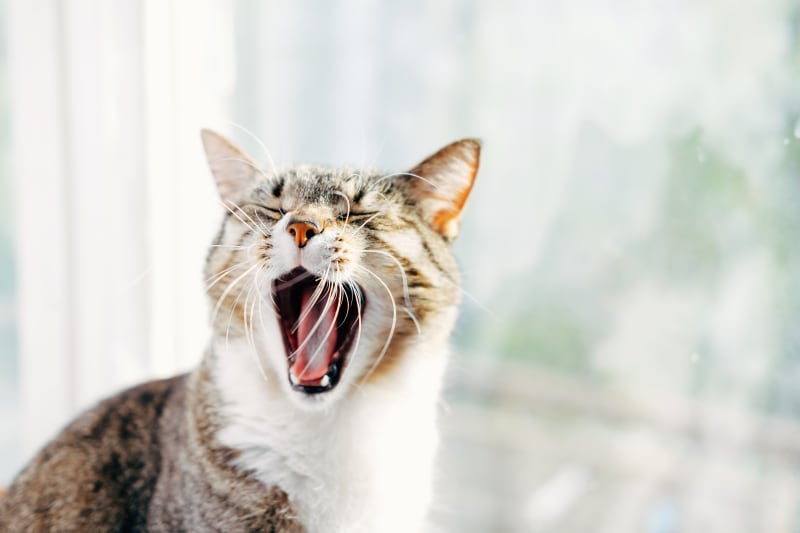If your cat is sleeping in the bathtub, it could be a sign of illness. Here’s what you need to know about this behavior and its potential causes.
Cats often seek cool and soothing places when they’re not feeling well. However, it’s important to observe other signs of sickness, such as changes in appetite, litter box habits, or overall behavior. If your cat continues to sleep in the bathtub or exhibits other concerning symptoms, it’s best to consult a veterinarian for a proper diagnosis and treatment.
Contents
- 1 An Unusual Choice For A Nap: Why Is Your Cat Sleeping In The Bathtub?
- 2 Signs Your Cat May Be Sick: Watch Out For These Clues
- 3 Potential Health Issues: What Could Be Affecting Your Cat
- 4 How To Create A Safe And Comfortable Bathtub Bed For Your Feline Friend
- 5 Understanding Your Cat’s Behavior: What The Bathtub Choice Means
- 6 When To Seek Veterinary Assistance: Don’t Ignore The Warning Signs
- 7 Tips To Keep Your Cat Healthy And Comfortable During Recovery
- 8 Frequently Asked Questions Of Sick Cat Sleeping In The Bathtub? Here’s What You Need To Know!
- 9 Conclusion
An Unusual Choice For A Nap: Why Is Your Cat Sleeping In The Bathtub?
Cats are known for their peculiar sleeping preferences, but finding your feline friend comfortably snoozing in the bathtub can be quite surprising. However, there are a few reasons why your cat may have chosen this unexpected spot for their nap.
Cats’ Natural Instincts
Cats have innate behaviors and instincts that influence their choice of sleeping locations. In the wild, cats would seek out hidden and enclosed spaces for safety and security. The enclosed nature of the bathtub may replicate this instinctual desire for security.
Seeking Cooler Environment
Cats are particularly sensitive to temperature and may choose cooler areas in your home to rest. The coolness of the bathtub surface can provide a refreshing escape from warmer areas during hot weather.
Privacy And Safety
Cats appreciate privacy and the solitude of the bathroom may appeal to them. It provides a quiet and secluded spot, away from other pets or household noise, promoting uninterrupted rest.
Signs Your Cat May Be Sick: Watch Out For These Clues
Sick Cat Sleeping In The Bathtub? Here’s What You Need To Know!
Cats can be mysterious creatures, making it challenging to determine if they are sick. However, there are subtle signs that may indicate your feline friend is under the weather. Keep an eye out for these clues:
Decreased appetite and weight loss:One of the first signs of illness in a cat is a decreased appetite and unexplained weight loss. If your cat is turning up their nose at their favorite treats or losing weight without any change in diet, it’s time to pay attention.
Lethargy and excessive sleeping:While cats are known for their love of sleep, excessive lethargy and sleeping can indicate an underlying health issue. If your active kitty suddenly becomes less interested in playtime and more inclined to snooze, it could be a sign of illness.
Changes in bathroom habits:Pay attention to any changes in your cat’s bathroom behaviors. This includes urinating more frequently, straining to use the litter box, or having accidents outside the box. Such changes could be a sign of a urinary tract infection or other health problems.
If you notice any of these signs, it’s important to consult your veterinarian for a proper diagnosis and treatment. Remember, early detection can greatly improve your cat’s chances of a speedy recovery.
Potential Health Issues: What Could Be Affecting Your Cat
Is your sick cat constantly finding comfort in the bathtub? Discover the potential health issues that may be affecting your feline friend and what you need to know about it.
Urinary Tract Infections
If your cat is sleeping in the bathtub, it could be a sign of a urinary tract infection (UTI). UTIs in cats are quite common and can cause discomfort and pain. Common symptoms include frequent urination, straining to pee, blood in the urine, and urinating in unusual places, such as the bathtub.
Arthritis And Joint Pain
Another possible reason for your sick cat sleeping in the bathtub is arthritis or joint pain. Cats, especially as they age, can develop arthritis which can make it difficult for them to find comfortable sleeping spots. The cool surface of the bathtub may provide relief for their aching joints.
Skin Allergies And Irritations
Skin allergies and irritations can also lead to your cat seeking out the coolness of the bathtub. Allergies to certain foods, fleas, or environmental factors can cause itchiness and discomfort. Cooling off on the smooth bathtub surface may provide some relief from the irritation.
If you notice your cat frequently sleeping in the bathtub, it’s essential to observe other signs and symptoms of potential health issues. Consulting with your veterinarian will help identify the underlying cause and provide the necessary treatment to keep your furry friend healthy and comfortable.
:max_bytes(150000):strip_icc()/how-to-make-your-cat-feel-better-2203791649-2000-f786bd5991fc43d7b29e82af938c76b5.jpg)
Credit: www.dailypaws.com
How To Create A Safe And Comfortable Bathtub Bed For Your Feline Friend
Discover how to create a safe and comfortable bathtub bed for your sick cat, ensuring they have a peaceful and restful sleep. Find out what you need to know to provide the perfect sleeping environment for your feline friend.
Understanding Your Cat’s Behavior: What The Bathtub Choice Means
Sick cats often seek out places that make them feel safe and secure, and one common choice is the bathtub. When a cat is not feeling well, they may choose to sleep in the bathtub as a way to cope with stress or anxiety. The enclosed space provides a sense of protection and can help them feel less vulnerable. Additionally, cats have a natural instinct to mark their territory, and the smooth surface of the bathtub makes it an ideal spot for scent marking.
If your cat is frequently sleeping in the bathtub, it’s essential to pay attention to their overall health and well-being. While it may be comforting for them in the short term, it could also indicate an underlying health issue. It’s a good idea to consult with your veterinarian to rule out any potential medical problems. By understanding your cat’s behavior and providing a safe and comfortable environment, you can help ensure their happiness and well-being.
When To Seek Veterinary Assistance: Don’t Ignore The Warning Signs
Sick cats can exhibit a range of unusual behaviors, including sleeping in the bathtub. It is essential to pay attention to your cat’s behavior and understand when it is necessary to seek veterinary assistance. One warning sign is their persistent refusal to leave the bathtub. If your cat consistently chooses to sleep in the bathtub instead of their usual spots, it could indicate a medical issue.
Another warning sign to watch for is dramatic changes in behavior. If your cat suddenly becomes more lethargic, loses their appetite, or experiences personality changes, it is important to consult with a veterinarian.
Furthermore, worsening of symptoms is a clear indication that your cat’s condition requires professional attention. If your cat’s symptoms, such as vomiting, diarrhea, or coughing, are getting worse or not improving despite at-home care, it is imperative to seek veterinary assistance to determine the underlying cause and provide appropriate treatment.
Tips To Keep Your Cat Healthy And Comfortable During Recovery
Regular veterinary check-ups are essential to ensure your cat’s health and wellness. Scheduling routine visits with a trusted veterinarian allows for early detection of any potential health issues and prompt treatment. Additionally, proper nutrition and hydration play a crucial role in your cat’s recovery. Ensure your cat is consuming a balanced diet that meets its specific nutritional requirements. Consult with your veterinarian regarding appropriate food choices for your recovering feline. It is important to provide easy access to fresh water at all times to keep your cat hydrated.
Creating a calm and peaceful environment is vital for your cat’s overall well-being. Provide a quiet space for your cat to rest and recover, away from loud noises and excessive activity. Consider using soothing music or a pheromone diffuser to promote relaxation. Minimal stress aids in a faster recovery process. Observing and managing your cat’s behavior during this time helps to identify any signs of discomfort or distress.
| Regular veterinary check-ups | Proper nutrition and hydration | Creating a calm and peaceful environment |
|---|---|---|
| Ensure early detection of health issues | Consult veterinarian for balanced diet | Provide a quiet space away from noise |
| Prompt treatment for any problems | Ensure fresh water is always available | Use soothing music or pheromone diffuser |
| Minimize stress for faster recovery |
Frequently Asked Questions Of Sick Cat Sleeping In The Bathtub? Here’s What You Need To Know!
Why Would A Cat Sleep In The Bathtub?
Cats may sleep in the bathtub due to its cool surface, providing relief from warm weather. The smooth texture may also offer comfort for relaxation. It’s a natural behavior for cats seeking a cozy and secure sleeping spot.
How Do Cats Lay When Sick?
Sick cats might lay in unusual positions or find comfortable spots, such as curled up or stretched out. They may also seek warmth or isolate themselves. Observing changes in behavior, appetite, or grooming can help determine if a cat is sick and requires medical attention.
What Do Cats Do When There Sick?
When cats are sick, they may display symptoms like lack of appetite, vomiting, diarrhea, coughing, sneezing, and lethargy. It is important to monitor their behavior and seek veterinary care to ensure proper diagnosis and treatment.
How Do You Keep Cats Out Of The Bathtub?
To keep cats out of the bathtub, close the bathroom door or use a baby gate. Provide alternative scratching posts and toys to redirect their attention. Spray citrus-scented repellent on the tub or use a motion-activated air spray. Ensure the cat has plenty of mental and physical stimulation.
Conclusion
To conclude, a sick cat sleeping in the bathtub may raise concerns, but it could indicate a variety of health issues or behavioral patterns. Understanding the possible reasons, such as seeking coolness or solitude, is crucial to providing proper care for your feline friend.
Creating a comfortable and stress-free environment, consulting with a veterinarian, and observing any changes in behavior are all essential steps in ensuring your cat’s well-being. Remember, your furry companion depends on you for their health and happiness!

Katie Lindsey is a passionate cat lover and founder of Cats Solution, a comprehensive resource for all things feline. With a lifelong love for cats and extensive knowledge in their care and behavior, she provides expert advice and solutions to cat owners. Through her website, Katie fosters a supportive community where cat enthusiasts can find guidance and heartwarming stories. A dedicated advocate for animal welfare, Katie also promotes responsible pet ownership and adoption. Join her on this purr-fect journey celebrating the joy of feline companionship.



